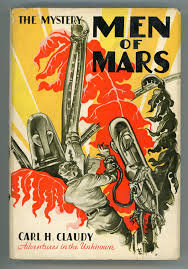Book Review: The Mystery Men of Mars by Carl H. Claudy
Dr. Isaac Lutyens, Professor of Physics and Higher Mathematics, has created what amounts to a gravitic engine. His first thought was to create a spaceship in his attic and orbit the moon. This being successful, Dr. Lutyens decides that the next step is to visit Mars. Brilliant but not in the best of health, the professor decides that he needs some assistants for the journey.
Dr. Lutyens’ vaguely worded jobs advertisement to the students nets 137 applications (college students needing spare cash then as now) from which he selects two. Alan Kane is nearly as smart as Dr. Lutyen’s, holds three undergraduate degrees in science, and is currently pursuing his doctorate. Theodore Dolliver is strong as an ox, can cook, and has come to University City to finish his education after several years of wandering the globe. They also just happen to be orphans with no current romantic attachments.
Dr. Lutyens nicknames Alan and Ted “Brains” and “Brawn” respectively and fills them in on his plans. Though the younger pair are skeptical of the viability of the journey, both of them are eager to take part in the adventure of being the first men on Mars.
This is the first book in the “Adventures in the Unknown” series by Carl H. Claudy (1879-1957), first published as a serial in The American Boy magazine in 1931. In addition to his science fiction in what we would now call the young adult field, Mr. Claudy was also a noted Freemason author and worked for DC Comics for a short period.
The author clearly did a bit of actual research for the story, as the characters discuss when the Earth and Mars will be closest, making their voyage shorter and thus more convenient. Constant acceleration and the effects of increased/decreased gravity are also discussed. On the other hand, it’s a good thing the mission didn’t require extra-vehicular operations, because the protective gear described would have been woefully inadequate.
Our protagonists are not on Mars more than an hour when they are captured by the local inhabitants, who they at first mistake for robots. Most of the Martians are in fact full-body cyborgs, whose brains have been cloned from either a Lesser Brain or the Master Brain, and infused with the information needed to fulfill their role in Martian society. The non-cyborged Martians are of the insect-like race that inhabited Mars’ surface eons ago.
The Martians have long since abandoned most fleshly emotions, with their highest calling being “the good of all.” The humans soon grasp that their one advantage over their captors is that they are violent and have guns, giving them long-range killing capability. While the Martians certainly have no qualms about killing, there has not been war or murder on their planet for millenia, so they don’t grasp what the Earthlings are willing to do to escape.
Indeed, the Martians are quite unable to understand that when they tell the humans that their brains will be placed in cyborg bodies to serve the good of all, this horrifies the humans and makes them even more determined to escape.
The professor, whose health has been failing, does not survive the escape attempt, forcing Alan and Ted to leave the planet on their own. Something goes wrong with the ship upon re-entry to Earth’s atmosphere, and the young men are forced to ditch it in the sea.
As it happens, Dr. Lutyens left no records of his research or plans for the gravitic engine anywhere that anyone can find. Nor did he tell anyone but his assistants about the spaceship or his plan to visit Mars. And the men brought back no proof of their story, so the world disbelieves and mocks their eyewitness testimony. And that’s where the book ends.
There’s some interesting ideas here, especially the cloned brains in robotic bodies with both strengths and weaknesses. But the characterization is of the thinnest, and priority is given to exciting adventure and gosh-wow technology. There’s also short shrift given to the morality of killing aliens; they don’t mind, why should our heroes?
If the concepts mentioned are up your alley, or you just enjoy fiction set on Mars, this might be worth looking up. For others, there are much better early science fiction works to look up.

